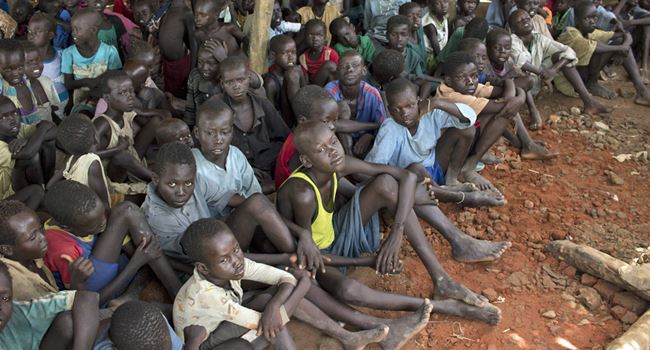News
1.4bn children under 16 children lack basic social protection, ILO, UNICEF reveal

New data from rhe International Labour Organisation (ILO) Save the Children and United Nations International Children Fund (UNICEF) has revealed that 1.4 billion children globally, aged under 16, lack social protection.
The children are therefore vulnerable to disease, poor nutrition and poverty, according to the data released Wednesday by the three bodies.
According to the data, in low-income countries fewer than 1-in-10 children have access to child benefits, highlighting a significant disparity compared to the coverage enjoyed by children in high-income countries.
Child benefits are a critical form of social protection, intended to promote the long-term well-being of children.
Delivered as cash or tax credits, child benefits are essential for reducing poverty as well as accessing healthcare, nutrition, quality education, water and sanitation.
In addition, these benefits support socio-economic development, particularly in times of crisis.
The three organizations called on governments to ensure all children are shielded by social protection mechanisms, including through universal child benefits.
The data also showed there had been a modest global increase in access to child benefits over a period of 14 years, from 20 per cent in 2009 to 28.1 per cent in 2023.
The data, however, showed the progress has been unequal. In low-income countries, rates of coverage remain staggeringly low, at around 9 per cent. At the same time, 84.6 per cent of children in high-income countries are covered.
Coverage rates for children in countries that are highly vulnerable to the impact of climate change are a third lower than those in countries that are not classified as being at high risk.
Ensuring children are covered by social protection is key to protecting them from the worst impact of the climate crisis.
Read also: Top 10 stories from across Nigerian Newspapers, Thursday, February 15, 2023
The Director, Social Policy and Social Protection, UNICEF, Natalia Winder Rossi, said: “Globally, there are 333 million children living in extreme poverty, struggling to survive on less than US$2.15 per day, and nearly one billion children living in multidimensional poverty.
“At the current rate of progress, achieving the Sustainable Development Goals’ poverty targets are out of reach. This is unacceptable.
“However, ending child poverty is a policy choice. Expanding social protection coverage of children in the fight against poverty is critical, including the progressive realisation of universal child benefits.”
Giving the regional breakdown, the data showed that in East Asia and the Pacific, child benefits coverage increased from 9.2 per cent in 2009 to 16.0 per cent in 2023.
In Eastern and Southern Africa, coverage increased from 9.6 per cent to 12.3 per cent.
In West and Central Africa, coverage increased from 3.1 to 11.8 per cent, while in Eastern Europe and Central Asia, coverage increased from 59.0 per cent to 61.4 per cent.
In North America, coverage has increased from 78.1 per cent to 84.0 per cent, while in Western Europe, coverage increased from 91.0 per cent to 93.2 per cent.
More marked improvements occurred during the same period in: Latin America and the Caribbean, where coverage rates increased from 30.8 to 41.9 per cent.
In the Middle East and North Africa, coverage rose from 22.7 per cent to 32.5 per cent, while in South Asia, it increased from 9.2 to 24.3 per cent.
ILO’s Director of Social Protection Department, Shahra Razavi said: “This is a crisis for the almost one billion children who are not covered by benefits, and for the countries in which they live.
“There is an urgent need for effective policymaking to help us close protection gaps. Regional inequalities in coverage and progress are of serious concern – improvement in child benefit coverage is marginal in most regions and too many children are still being left behind.”
To bolster efforts to monitor and reduce the gaps in child benefit coverage, Save the Children, ILO and UNICEF have developed the Global Child Benefits Tracker, an online platform to monitor children’s access to benefits and advocate with governments and donors to close the gaps.
The launch is coming at a time when the most recent data shows that 829 million children globally are living in households where per-person incomes are below US$3.65 a day and progress on child poverty reduction has largely stalled.
Global Policy and Advocacy Lead for Child Poverty, Save the Children International, David Lambert Tumwesigye, said: “Child benefits support families to afford better nourishment, health, education, and protection and are key for realising children’s rights and enhancing their potential as adults. Child benefits are therefore critical to building inclusive and resilient economies for the future.
“Unfortunately, many countries have not prioritised investment in social protection. Through the Child Benefits Tracker, we highlight the scale of global child poverty and examples of progress to inspire greater political will and investment in child-sensitive social protection systems,”
Join the conversation
Support Ripples Nigeria, hold up solutions journalism
Balanced, fearless journalism driven by data comes at huge financial costs.
As a media platform, we hold leadership accountable and will not trade the right to press freedom and free speech for a piece of cake.
If you like what we do, and are ready to uphold solutions journalism, kindly donate to the Ripples Nigeria cause.
Your support would help to ensure that citizens and institutions continue to have free access to credible and reliable information for societal development.






















